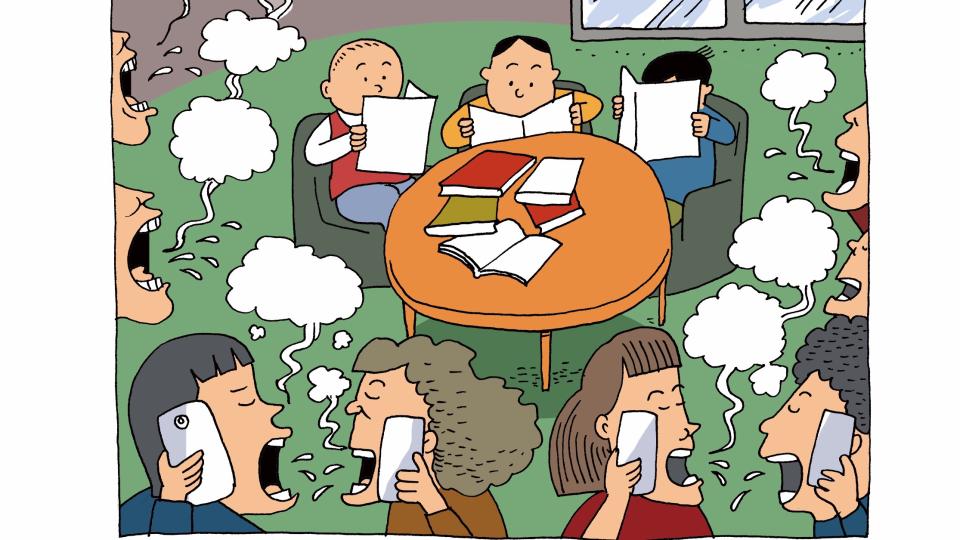“Where is your child?” the security guard asks me. “I don’t have a child,” I reply, wondering if he thought I’d misplaced it. “Then you can’t come in.” Thus my attempt to visit the Children’s Hall of the National Library in west Beijing was almost frustrated.
I explained to the guard that I was there to do some research on children’s literature and just when I was beginning to think it might be quicker to conceive a child and wait till it was of reading age than try to deal with this unexpected hurdle, a member of staff inside the library saw me in the doorway and came to see what was going on.
It was a Saturday afternoon in early February and despite the smog, the futuristic architecture of the children’s library managed to leap out of the gloom, clashing with the faux traditional style of the main library. And it was packed. Children were streaming past, dragging their parents to the reception desk. Inside were unknown hundreds of kids at tiny tables, on foam floor tiles, on parents’ laps.
The librarian asked what I wanted. I explained my project and was admitted. We stood at the desk as she helped me look things up on the system, and I began to notice just how different it was from a visit to a library in my own country, the UK.
First of all, on my last visit back to my hometown on the edge of what in China would be a second tier city, I found that the library’s children’s department had been banished from its own room to just being a section. Its former location, where I’d sit on plastic stools with my sister and select enough books to max out my allowance, is now filled with computers intended to “re-skill” local adults. There simply aren’t as many children, though I expect a visit to the British Library in London is a bit more lively.
Here in Beijing, just like in any book shop I’ve ever been to in China, children were everywhere. Reading books, discussing books and manning the front desk. Back in England my mother is pretty much the youngest volunteer. Junior visitors here took their parents’ ID cards to scan them in at the entrance. I saw families being turned away simply because the parents hadn’t both brought their ID cards to be checked into the system. Others had to go to another building to check in their bags before coming back and trying to get through security again.
The librarian had difficulty finding some of the books I was looking for. “We only really stock books up to about 3 or 5 years old,” she told me. Again, you’d be hard-pressed to find anything newer than five years old back home, though at least the classics new and old are still there.
The librarian escorts me through the throngs of very small children and furniture upstairs where everything and everyone is slightly larger. She’s showing me a section of books similar to what I’m looking for when a mobile phone starts ringing. And keeps ringing. The librarian approaches the adult from where the sound is emanating to tell her that her phone is ringing. “I know,” says the lady, who must be the parent of one of the silent children nearby, “I wasn’t going to answer.”
My guide deals with her and takes me to the stacks to show me another set. Again, more mobile ringing, this time with a loud“Wei?” as the parent takes the call, the couple of children looking up possibly being his offspring.
We tiptoe through the shelves and over the children to a sort of crossroads where a dad, or someone who likes no background noise when making calls, has dialled a number and is bringing his phone to his ear to start a conversation bellowing, “Eyy! I’m in the library. Where are you?” And I’m left wondering whether the no-child-no-entry policy is part of the library’s efforts just to keep all adults out. Thankfully the kids were good as gold and old enough to be conditioned to China’s requirement of total noise. Absorbed in their books, they were just getting on with things, but for the adults, maybe the quiet was becoming unsettling.
On leaving the library there was one last crucial difference: getting out. It was easy–just a door to the outside, next to the entrance where children were getting their ID ready while waiting to go through the metal detectors. Back home all the books have antitheft tags that trigger detectors at the exit. With a list of titles for my project I head back to the subway realizing that a kid’s visit to a library itself might be more instructive in how life is going to be in that country than what’s contained in any of the books.

 Old Version
Old Version